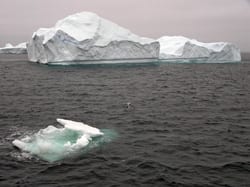Woods Hole Consortium Delegates Participating in U.N. Climate Change Conference in Copenhagen this Week
December 11, 2009
CONTACTS:
Andrea Early, Marine Biological Laboratory
508-289-7652; aearly@mbl.edu
Media Relations Office, Woods Hole Oceanographic Institution
508-289-3340; media@whoi.edu
Elizabeth Braun, Woods Hole Research Center
508-540-9900, x109; ebraun@whrc.org
WOODS HOLE, MA—Directors and scientists from the Woods Hole Consortium are in Copenhagen, Denmark, this week to speak on climate change impacts on ocean, air, land, and polar-ice ecosystems—whose fates are inextricably linked—at the United Nations Climate Change Conference (COP15).
The Woods Hole Consortium, whose members include the Marine Biological Laboratory (MBL), Woods Hole Oceanographic Institution (WHOI), and Woods Hole Research Center (WHRC), was formed in April 2009 to bring the three organizations’ combined scientific power to bear on some of the major issues facing society today.
The Woods Hole Consortium is actively involved in formulating the scientific basis for climate and environmental policy decisions, both in the U.S. and internationally.
WHOI and MBL are participating in the COP under the auspices of the WHRC, which is a registered observer to the UNFCCC.
In Copenhagen, WHRC will participate in events and sessions throughout the two-week meeting, primarily addressing the issues surrounding Reduced Emissions from Deforestation and forest Degradation (REDD). This issue, which came into the forefront of climate negotiations at COP13, in Bali, Indonesia, is central to the language of an agreement which could succeed the Kyoto Protocol.
The WHRC has released a series of reports and publications related to the key aspects of REDD. Those are available at www.whrc.org/cop15. Acting Director R. A. Houghton and Director Designee William Y. Brown are presently in Copenhagen.
WHOI and MBL will be panelists at Oceans Day on Dec. 14, which will highlight the importance of oceans, coasts, and small-island developing nations in climate change assessments and policy deliberations.
Susan Avery, director and president of WHOI, will present an introductory overview to Ocean Day attendees, who include H.S.H. Prince Albert II of Monaco (delivering the keynote address) and many other international policymakers.
Also representing the Woods Hole Consortium at Oceans Day are Gary G. Borisy, director and CEO of the MBL, who will speak on the impacts of climate change on marine biodiversity; and Scott Doney, senior scientist at WHOI, who will speak on ocean acidification as a result of CO2 emissions. During the conference, the two organizations will also release a “white paper” on the ocean’s role in climate and how climate change impacts the oceans.
Woods Hole Consortium scientists attending COP 15 include Linda Deegan of the MBL Ecosystems Center; Carin Ashjian and Richard Camilli of WHOI; and Alessandro Baccini, Andrea Cattaneo, Connie J. Clark , Michael T. Coe, Eric A. Davidson, Scott Goetz, Nora Greenglass, Tracy Johns, Josef Kellndorfer, Nadine T. Laporte , Daniel C. Nepstad, John R. Poulsen, Wayne S. Walker of WHRC.
For more information on the Woods Hole Consortium and its participation in COP 15, go to:
http://www.woodsholeconsortium.org/
The Woods Hole Oceanographic Institution is a private, independent organization in Falmouth, Mass., dedicated to marine research, engineering, and higher education. Established in 1930 on a recommendation from the National Academy of Sciences, its primary mission is to understand the oceans and their interaction with the Earth as a whole, and to communicate a basic understanding of the oceans’ role in the changing global environment.

